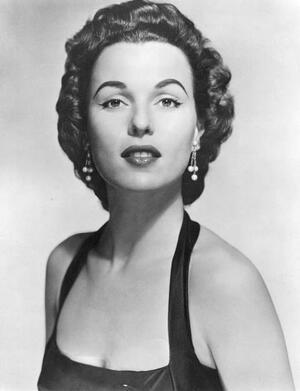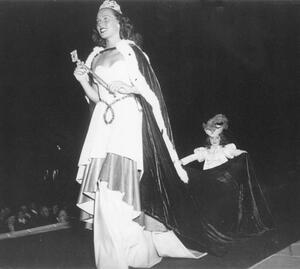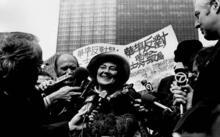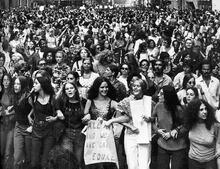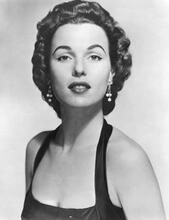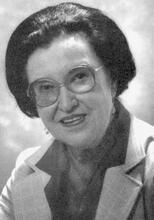Bess Myerson
When Bess Myerson encountered anti-Semitism as the first Jewish Miss America in 1945, she used her new-found fame to fight hatred through the Anti-Defamation League. She became a spokesperson and eventually national commissioner for the Anti-Defamation League. In 1969, she was appointed commissioner of New York’s Department of Consumer Affairs, setting up a consumer hotline and conducting daily surprise raids at businesses with high numbers of complaints. In 1980, she became commissioner of cultural affairs for New York, doubling the budget for the city’s cultural institutions. She also helped found the Museum of Jewish Heritage in New York and in 1998 she endowed a student journalism award for the ADL.
Background
The first Jewish Miss America, Bess Myerson transformed the fame bestowed upon her because of her beauty into an illustrious public career.
Born in the Bronx on July 16, 1924, to Louis and Bella Myerson, immigrants from Russia, Myerson grew up during the Depression. Along with her parents and her two sisters, the younger Helen and the older Sylvia, she lived in the Sholem Aleichem Cooperative, which housed 250 Jewish working-class, politically liberal families. As a student at the High School of Music and Art, Myerson studied the piano and the flute.
Miss America Pageant
After Myerson graduated from Hunter College in 1945 with a degree in music, her sister Sylvia, seven years her elder, entered her photograph in the Miss America pageant. Although she was advised to change her name so that she would not be recognized as a Jew, Myerson refused, affirming her Jewish identity and becoming the darling of American Jews.
Although some of the judges received anonymous phone calls warning them not to vote for the Jewish contestant, Myerson was the favorite and won over the judges with her dark-haired beauty and musical talent. Encountering antisemitism and racism for the first time, she had a difficult and eye-opening year as Miss America. She witnessed segregation in the South and experienced the humiliation of being turned away at a country club that did not admit Jews. For unconfirmed reasons, three out of the five sponsors of the Miss America pageant pulled out of the arrangement that the winner would advertise for them. In response to these experiences, Myerson began to speak out against racial hate for the Anti-Defamation League (ADL) at schools and halls all over the country. On October 19, 1946, Myerson married Allan Wayne, and on December 31, 1947, gave birth to a daughter, Barbara. Myerson and Wayne divorced in 1956. Although her private life was shaky, with a difficult custody battle, Myerson’s public career swung into action in this decade. She began a lucrative television career as the mistress of ceremonies, known as the “Lady in Mink,” for The Big Payoff from 1951 to 1959. She was also a regular panelist on I’ve Got a Secret from 1958 to 1967. In addition, she hosted the Miss America Pageant from 1954 to 1968, both alone and with such distinguished cohosts as Walter Cronkite.
Career
On May 2, 1962, Myerson married Arnold Grant, a financial and tax attorney who was very well connected. He formally adopted her daughter, now Barra Grant. During this period, Bess Myerson became active in city politics and was appointed commissioner of New York City’s Department of Consumer Affairs by Mayor John Lindsay. She became the most visible city official apart from the mayor during the years she served under him, from 1969 to 1973. She cultivated a reputation as the consumer’s best friend, setting up a consumer hotline and a Consumer Action Team that conducted daily surprise raids at businesses in high-complaint areas. Myerson used the media wisely and to her advantage to scare fraudulent businesses and heighten consumer protection awareness. During her years in office, New York City had what was at that time the most far-reaching consumer protection legislation in the country.
Building on her reputation, Myerson wrote The Complete Consumer in 1979. In 1982, she coauthored The I Love New York Diet with Bill Adler, which reached the New York Times Book Review best-seller list.
She continued her career in city politics as the campaign chair for Ed Koch in 1977. After losing the Democratic nomination for the United States Senate in 1980, she was again appointed to a city post as the commissioner of cultural affairs from 1983 to 1987, where she doubled the budget, dramatically increasing financial support to many of New York’s cultural institutions.
Myerson again was in the news when her boyfriend Andy Capasso was indicted. An investigation was made into Myerson’s involvement, which found her guilty of “serious misconduct.” She was subsequently indicted on six counts, including conspiracy, obstruction of justice, and mail fraud, on October 3, 1987. However, she was acquitted of all charges in December 1988. Myerson then retired from a long career in the public eye.
Bess Myerson stayed close to the Jewish tradition and people throughout her career, always presenting herself as a Jewish public figure. From her early years delivering speeches for the Anti-Defamation League, she went on to serve as the national commissioner, and, in 1998, endowed the ADL’s annual Bess Myerson Campus Journalism Award. Myerson also acted as a spokeswoman for Israeli Bonds and was honored by United Jewish Appeal. She was a founder of The Museum of Jewish Heritage in New York, where she established the Bess Myerson Film and Video Collection.
Bess Myerson died on December 14, 2014, at her home in Santa Monica, California. She was 90 years old.
Alexander, Shana. When She Was Bad: The Story of Bess, Hortense, Sukhreet and Nancy (1990).
Dworkin, Susan. Miss America, 1945: Bess Myerson’s Own Story (1987).
Preston, Jennifer. Queen Bess: The Unauthorized Biography of Bess Myerson (1990).
“Bess Myerson.” Jewish-American Hall of Fame Virtual Tour, 2004.

